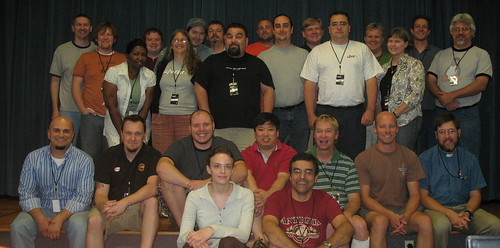 Have you ever wondered who benefits from creating an accessible design? One that meets the needs of people who have impairments like the vision impaired. When I think of people in this situation I usually envision someone who is blind and can't think of many blind people. This can give way to the feeling that there aren't that many people with impairments and on the basis of this it's easy to make designing an accessible site a low priority.
Have you ever wondered who benefits from creating an accessible design? One that meets the needs of people who have impairments like the vision impaired. When I think of people in this situation I usually envision someone who is blind and can't think of many blind people. This can give way to the feeling that there aren't that many people with impairments and on the basis of this it's easy to make designing an accessible site a low priority.
According to the U.S. Census Bureau there are up to 60 million Americans with disabilities that are trying to use a computer to learn and interact on the web. If you do that math that's roughly 20% of the U.S. population. Yet, awareness of this issue seems to be fairly low and many designers are building sites and web applications that aren't usable to this 20%.
Are you still having trouble envisioning who this 20% is? Let's look at one large group. Consider everyone with color blindness. In the U.S. about 7% of men are color blind. In Australia the number is 8% of men. These men, not only have trouble picking out matching clothes but, have trouble reading parts of the screen where different colors point out different things. Take for example a set of links in a blog post. Color them a different color from the rest of the text and remove the underlining (a commonly used technique). Someone without any vision issues can see them fine. Someone with color blindness is likely to miss the link denoted by a different coloring. And there you have an inaccessible design.
So, next time you create a new design or update an existing design consider making it an accessible design. There are a lot more people out there with accessibility issues that you might think.
 We just closed the door on the first
We just closed the door on the first 

 Do you know many passionate Christians? I'm not talking about the Christians who are obsessed Christian stuff. I'm talking about those who are obsessed with the
Do you know many passionate Christians? I'm not talking about the Christians who are obsessed Christian stuff. I'm talking about those who are obsessed with the  This is a question that can and has gone a lot of different ways. It's not a matter of what we should measure but a matter of should we try to measure the effectiveness of the church at all. For some it's all about numbers. They want to measure their churches growth rates so they can compare it to other churches. The alternative to this view says we can't compare one church to another because God calls different groups in different ways. In an effort to skirt comparisons churches may try not to have what they do measured.
This is a question that can and has gone a lot of different ways. It's not a matter of what we should measure but a matter of should we try to measure the effectiveness of the church at all. For some it's all about numbers. They want to measure their churches growth rates so they can compare it to other churches. The alternative to this view says we can't compare one church to another because God calls different groups in different ways. In an effort to skirt comparisons churches may try not to have what they do measured. Our society has become a meat and potatoes culture in many ways. In our entertainment we may like fluff but, in our religions, spirituality, thinking, and social action we like the deep stuff. The meat and potatoes rather than the garnish. When it comes to your church or ministry, do people see your meat and potatoes? Let's look at the different it can make.
Our society has become a meat and potatoes culture in many ways. In our entertainment we may like fluff but, in our religions, spirituality, thinking, and social action we like the deep stuff. The meat and potatoes rather than the garnish. When it comes to your church or ministry, do people see your meat and potatoes? Let's look at the different it can make. After sharing
After sharing  Have you noticed how many people want and expect something for free. To some extent I can understand this in the church. If you can get one thing for free you can use that few extra dollars you saved to do something else great for the kingdom. But, is anything really free? If so, where should we have that expectation?
Have you noticed how many people want and expect something for free. To some extent I can understand this in the church. If you can get one thing for free you can use that few extra dollars you saved to do something else great for the kingdom. But, is anything really free? If so, where should we have that expectation?
Recent comments